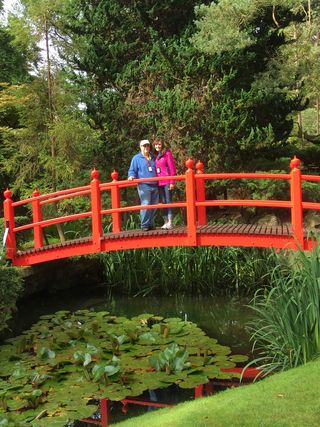Marriage
What Helps People Live a Long and Satisfying Life?
New research suggests it may be solid face-to-face relationships!
Posted July 16, 2017
My husband, Ted, and I just celebrated our 30th wedding anniversary. Last year we both decided that it would be fun to travel to Ireland and Scotland for this landmark anniversary, as we both have Irish and Scottish heritage. We planned all year round. It was quite fun to make all the necessary arrangements. Of course, Ted and I thought making it to 30 years of marriage was amazing.

During our trip, we went to a dinner show featuring Celtic Dancers. At our table were three other couples. We all began talking about why we selected Ireland. I said we were celebrating our 30th anniversary. One California couple said they had been married for 38 years. The next California couple had been married 44 years, and the last couple from New Zealand had been married 54 years! Thirty years seemed like such an accomplishment, but the other couples had managed even more. I was almost stunned, and I was curious to ask what helped couples get that far. Before the show began, we briefly discussed what made their marriages work.
Here are their responses! Wyatt who was definitely the patriarch of this group at age 76 robustly started by stating, “We both have our own strengths and weaknesses.” He put his two palms on top of each other to demonstrate that when you join the strengths together, it creates a strong foundation. Then as almost an afterthought, he exclaimed that that he and Jeanne did not enter into this relationship impulsively and had known each other five years before they got married. He also discussed that they entered into the marriage committing to each other forever. Jeanne also said they are in a choir and are very active.
Those were very difficult shoes to fill, but then Jerry from the 44-year-old marriage quickly laughed and added. “It is the woman who makes a marriage work!” His wife, Ophelia, smiled and agreed. Jerry believes that women are more flexible and make the marriage bend when needed.
Then Iva and Don from the 38-year-old marriage chimed into the conversation. Iva confidently said it was respect for one another and the want to communicate with each other. A good sense of humor is vital. Don nodded his head in agreement. Don also stated that they love to sail together.
I then turned to Ted for his input. He said couples must be willing to forgive one another as well. I added that adapting to life experiences was essential too and throw in some fun, if at all possible! So, in a few short moments we had created an excellent profile for a long-lasting marriage. The recipe looks like this. Allow the strong aspects of each person to come together and form a solid ground that alone would not be as resilient and unique. Have an expectation and commitment that no matter what, the couple will resolve any problems. Be forgiving and don’t hold grudges. Be flexible and adaptable. Be respectful to one another. Talk with each other and listen for understanding. Enjoy each other’s company. Have some fun. Engage in social organizations and hobbies. Our profile sounds very solid.
I began to wonder if any empirical research might back up our small marriage profile. Thanks to a 2015 book titled The Village Effect: How Face-to-Face Contact Can Make Us Healthier and Happier by Dr. Susan Pinker, I read many research articles that focused on marriages, but also other predictors for living a long and healthy life.
Pinker wrote about the importance of belonging, and she discussed old and new research that continued to validate that need for belonging. In 1979, epidemiologists from Berkeley, Lisa Berkman and Leonard Syme, discovered through a 7000 person survey that a “community’s social bond accurately predicted its mortality rates. Those people who survived to old age had very strong face-to-face relationships including long marriages, frequent gathering with families and friends, religious groups, and/or regular commitments such as hiking, bridge, etc.”
Then in 2010 psychologist Julianne Holt-Lunstad examined 148 longitudinal studies on health and aging. She found that people who were lonely died much soon than those who were integrated into their communities. Integrated folks were at half the risk of dying in the next seven years.
My small marriage profiled turned out to be fairly accurate. Belonging is important to us all. So, take the time to nourish your face-to-face relationships, and you may just have a wee bit of Scottish happiness scattered with a bit of Irish luck!
Yours in brain health, Lori
Be sure to also check out the Online Counseling Program at Bradley University for more useful resources!
References
Pinker, S. (2015). The Village Effect: How Face-to-Face Contact Can Make Us Healthier and Happier. Toronto:
Random House Canada.


